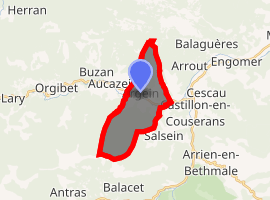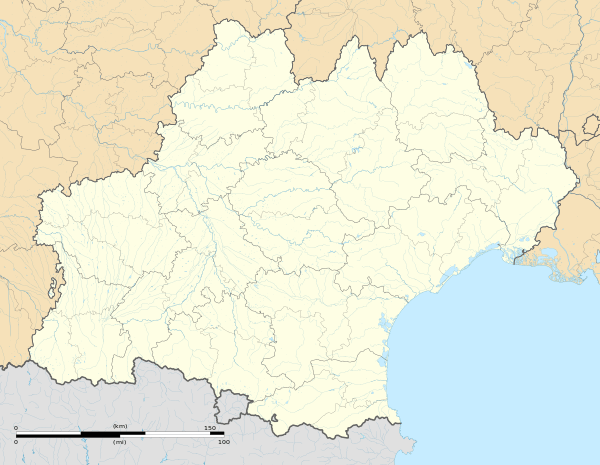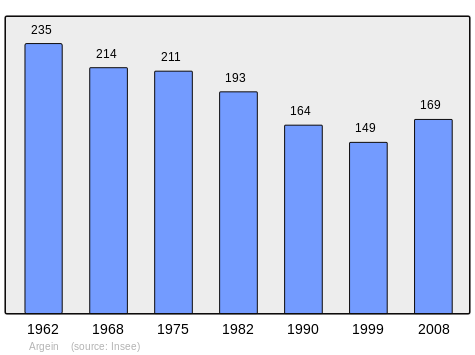Argein
Argein (Occitan: Argenç) is a commune in the Ariège department in the Occitanie region of south-western France.
Argein | |
|---|---|
The drinking trough in Argein | |
Location of Argein 
| |
 Argein  Argein | |
| Coordinates: 42°55′56″N 0°59′36″E | |
| Country | France |
| Region | Occitanie |
| Department | Ariège |
| Arrondissement | Saint-Girons |
| Canton | Couserans Ouest |
| Intercommunality | Castillonnais |
| Government | |
| • Mayor (2014–2020) | Denis Lourde |
| Area 1 | 11.09 km2 (4.28 sq mi) |
| Population (2017-01-01)[1] | 194 |
| • Density | 17/km2 (45/sq mi) |
| Time zone | UTC+01:00 (CET) |
| • Summer (DST) | UTC+02:00 (CEST) |
| INSEE/Postal code | 09014 /09800 |
| Elevation | 517–1,675 m (1,696–5,495 ft) (avg. 534 m or 1,752 ft) |
| 1 French Land Register data, which excludes lakes, ponds, glaciers > 1 km2 (0.386 sq mi or 247 acres) and river estuaries. | |
The inhabitants of the commune are known as Argenois or Argenoises[2]
Geography
Argein is located some 12 km south-west of Saint-Girons just a kilometre west of Audressein. Access to the commune is by the D618 road from Audressein in the east passing through the centre of the commune and the village and continuing west to Aucazein. Apart from the village there is also the hamlet of Viellot. The centre of the commune is the valley of the Bouigane oriented east-west where the village lies. In the valley there is some farmland however the rugged north and south of the commune is heavily forested.[3]
The Buouigane river flows along the central valley east to join the Léz at Audressein. Some tributaries rise in the commune to join the Bouigane including the Ruisseau d'Auriech and the Ruisseau de Sol.[3]
Neighbouring communes and villages[3]
Administration
List of Successive Mayors[4]
| From | To | Name | Party | Position |
|---|---|---|---|---|
| 1791 | 1792 | Jacques Bataille | ||
| 1792 | 1796 | Jacques Fourment | ||
| 1796 | 1802 | Jean Doumenc | ||
| 1802 | 1811 | Jean Argela | ||
| 1811 | 1813 | Jean Doumenc | ||
| 1813 | 1830 | Jean Argela | ||
| 1830 | 1837 | Jean Bourdeau | ||
| 1837 | 1847 | Bernard Doumenc | ||
| 1847 | 1857 | Gaudens de Meritens de Roses | ||
| 1857 | 1870 | André Tap | ||
| 1870 | 1899 | Jean-Pierre Ille | ||
| 1899 | 1904 | Jean Ferre | ||
| 1904 | 1915 | Pierre Pujol | ||
| 1915 | 1919 | François Bauby | ||
| 1919 | 1929 | Michel Ferre |
- Mayors from 1929
| From | To | Name | Party | Position |
|---|---|---|---|---|
| 1929 | 1945 | François Dedieu | ||
| 1945 | 1965 | Guillaume Ortet | ||
| 1965 | 1971 | Jean Delbert | ||
| 1971 | 1977 | François Bauby | ||
| 1977 | 2001 | Guy Dubuc | ||
| 2001 | 2014 | Raymond Junca |
(Not all data is known)
Demography
In 2009 the commune had 176 inhabitants. The evolution of the number of inhabitants is known from the population censuses conducted in the commune since 1793. From the 21st century, a census of communes with fewer than 10,000 inhabitants is held every five years, unlike larger towns that have a sample survey every year.[Note 1]
| 1793 | 1800 | 1806 | 1821 | 1831 | 1836 | 1841 | 1846 | 1851 |
|---|---|---|---|---|---|---|---|---|
| 632 | 385 | 632 | 636 | 674 | 779 | 846 | 881 | 837 |
| 1856 | 1861 | 1866 | 1872 | 1876 | 1881 | 1886 | 1891 | 1896 |
|---|---|---|---|---|---|---|---|---|
| 762 | 736 | 767 | 784 | 657 | 624 | 634 | 638 | 626 |
| 1901 | 1906 | 1911 | 1921 | 1926 | 1931 | 1936 | 1946 | 1954 |
|---|---|---|---|---|---|---|---|---|
| 583 | 539 | 515 | 380 | 373 | 335 | 342 | 271 | 262 |
| 1962 | 1968 | 1975 | 1982 | 1990 | 1999 | 2006 | 2009 | - |
|---|---|---|---|---|---|---|---|---|
| 235 | 214 | 211 | 193 | 164 | 149 | 156 | 176 | - |

Sites and Monuments
The Parish Church of Saint Peter is an old Romanesque church from the 12th century and now an integral part of a church originally built in the 9th century. The original semicircular Apse forms the south aisle of the present building. There is an altar bearing a very ancient inscription (prior to the 4th century) depicted again in the south wall of the church. The Church contains many items that are registered as historical objects:
- 2 Altar Candlesticks (17th century)

- 2 Collection Plates (16th century)

- A Thurible (17th century)

- A Ciborium (1638)

- A Chalice (17th century)

- A Chalice with Paten (16th century)

- A Statue: Saint Peter (18th century)

- A Tabernacle (18th century)

- An Altar, Retable, and Altar Dais (18th century)

- A Monumental Painting on the southern exterior facade and interior walls (17th century)

Notable people linked to the commune
- Honoré Laffont, born 6 October 1901 at Argein and died on 14 February 1975. An international Rugby player (1st time in 1926 against Wales). He was twice a finalist in the championship of France with RC Narbonne (1932 and 1933). He played scrum half (1.65m, 62 kg). He was also coach for RC Narbonne.
See also
External links
- Argein on the National Geographic Institute website (in French)
- Argein on Lion1906
- Argein on Géoportail, National Geographic Institute (IGN) website (in French)
- Argein on the 1750 Cassini Map
Notes and references
Notes
- At the beginning of the 21st century, the methods of identification have been modified by Law No. 2002-276 of 27 February 2002 Archived 6 March 2016 at the Wayback Machine, the so-called "law of local democracy" and in particular Title V "census operations" allows, after a transitional period running from 2004 to 2008, the annual publication of the legal population of the different French administrative districts. For communes with a population greater than 10,000 inhabitants, a sample survey is conducted annually, the entire territory of these communes is taken into account at the end of the period of five years. The first "legal population" after 1999 under this new law came into force on 1 January 2009 and was based on the census of 2006.
References
- "Populations légales 2017". INSEE. Retrieved 6 January 2020.
- Inhabitants of Ariège (in French)
- Google Maps
- List of Mayors of France (in French)
- Ministry of Culture, Palissy PM09000018 2 Altar Candlesticks (in French)

- Ministry of Culture, Palissy PM09000017 2 Collection Plates (in French)

- Ministry of Culture, Palissy PM09000016 Thurible (in French)

- Ministry of Culture, Palissy PM09000015 Ciborium (in French)

- Ministry of Culture, Palissy PM09000014 Chalice (in French)

- Ministry of Culture, Palissy PM09000013 Chalice with Paten (in French)

- Ministry of Culture, Palissy PM09000012 Statue: Saint Peter (in French)

- Ministry of Culture, Palissy PM09000011 Tabernacle (in French)

- Ministry of Culture, Palissy PM09000010 Altar, Retable, and Altar Dais (in French)

- Ministry of Culture, Palissy PM09000001 Monumental Painting on the southern exterior facade and interior walls (in French)
| Wikimedia Commons has media related to Argein. |